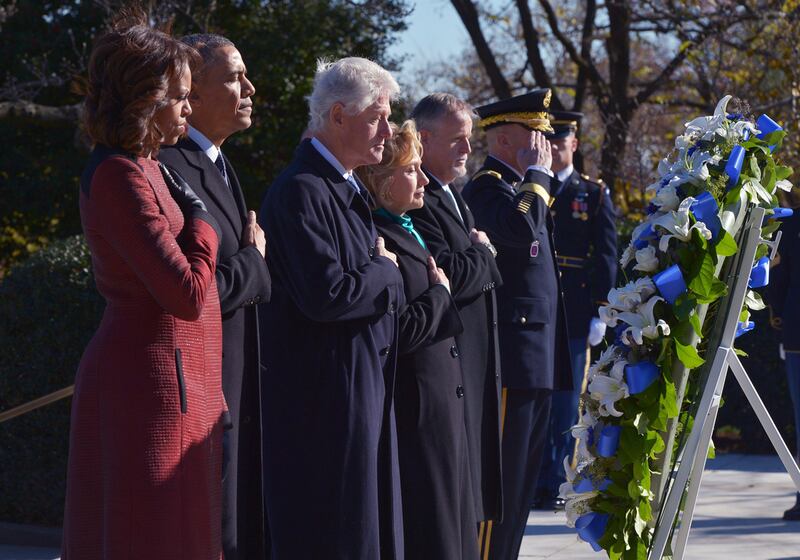We cannot get past it, we Americans. Not a half century later. Maybe not even ever.
The president with the easy grin in whom so much hope was invested. His wife, forever frozen in pink and pillbox hat. The motorcade. The sunny day. The shadowy man in the window with a rifle. Even more shadowy, the man on the nearby “grassy knoll” who perhaps existed, perhaps didn’t. The flickering, silent colour film of a leader’s final moments. And the way it is described, even now, by so many Americans: the “loss of innocence” that left us vulnerable to so much of the heartache and tumult that was still to come. If, that is, we were ever truly innocent in the first place.
We should move on, maybe. But we don’t. From that moment in Dallas – that moment scoured and buffed for so long, visited and revisited by so many people with so many agendas for so many years – from that moment until now, Americans will not let go of this event that changed so much and, just as significantly, was thought to have changed so much more. Even as the world lurched forward, Pause was pressed on that moment, and Play has never really been pressed again.
Why? Here’s one two-word answer: baby boomers.
It is they who have carried this torch, they who have fuelled its flame. When talk turns to the inevitable question – “Where were you when you heard the president had been shot?” – the dominant answer in American culture is this one: “I was in school.” It is almost as if no adults were around on the Friday of the assassination, except as bit players. This is because baby boomers – who were, indeed, in school that day – are the ones who have shaped the national memories of this event.
For this generation – the Americans who were 17 and under on that day and, today, are from 67 down to, say, 49 – the assassination of John F Kennedy remains the watershed event that birthed the decade we know as the Sixties and rippled out, year after year, into politics and science and art and culture. It has been a singular snowball rolling down a hill, still gathering debris and holding on to momentum as it hurtles through succeeding generations.
“This murder in broad daylight ... Everything changed,” says Oliver Stone, the boomer director who served in Vietnam and made a movie about it before turning his distinctively critical lens on the Kennedy assassination.
Because he knows what becomes clearer with each passing year: for better and for worse, it was the event that defined the generation that has defined the way we look at the world today.
“So, what constitutes a Baby Boomer? Opinions vary, but most agree that a Boomer was born between 1946 and the start of the Vietnam War (about 1963). I, however, submit that a real Boomer is defined by the recollection of a world-changing event: JFK’s assassination.” – Ron Enderland, operator of a blog called “I Remember JFK: A Baby Boomer’s Pleasant Reminiscing Spot”.
To define the collective traits of a generation – to broad-brush millions of Americans with a statement like “they think” or “they believe” – is a futile pursuit. Many have tried, particularly with the boomers. Most have fallen short. The group is too diverse.
Yet when it comes to this event, boomers are often united by the way they characterise it. Many have described it not simply as an ending – of a life, a presidency, an era – but as a beginning. It is variously cast as the start of when America took a turn for the worse, the beginning of deep distrust of government, the unleasher of many kinds of chaos – and, of course, the dawn of the acceleration of the Vietnam War and the out-of-control decade it defined.
“It has become a founding crisis ... for this generation in particular,” says Art Simon, author of Dangerous Knowledge: The JFK Assassination in Art and Film.
“They have made it their own,” he says. “They made it part of what came after it. They made it part of this revision, or this crisis, over governmental legitimacy. Or they used it as a founding moment for the unravelling of government legitimacy.”
Generations are funny things, if they even truly exist at all. An event that changes reality for one generation can, with the passage of time, be a mere historical footnote for another. The Kennedy assassination still resonates across American culture and will for many more years.
“I was only really aware of how profoundly it changed the country years later when I was in college, because Kennedy’s assassination started a chain reaction – a kind of house of cards started to come down, not immediately but gradually over the next decade,” Steven Spielberg, born in 1946, wrote in Where Were You? America Remembers the JFK Assassination.
What more is there to say? About this, will there always be more? To deploy an old Kennedy metaphor, the torch is being passed to a new generation of Americans. What they will do with it – and whether they can, or even should, let it go and move on – is the JFK assassination story of the next half century.
* Associated Press





